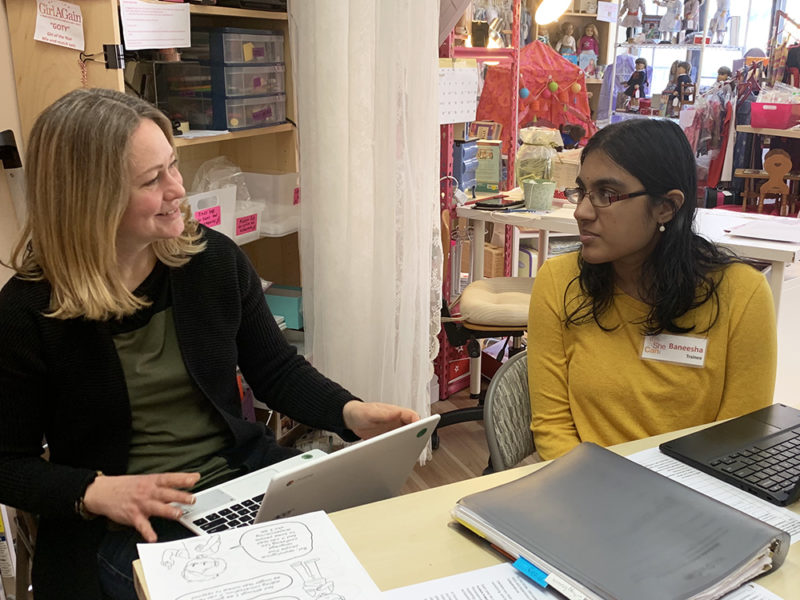Empowerment is the theme that is woven into the training model at Yes She Can, Inc. Training young women with autism to be successful employees starts with a shared belief that women with autism can develop powerful voices in their own lives and in supporting the lives of others.
We integrate training around the specific challenges to women; as well as focusing on learning basic employment and business skills while also teaching and supporting emotional regulation skills and building social competencies. Behavioral skills (often referred to as soft skills), generally the most challenging for our trainees, is our focus area. Developing strategies to manage one’s own anxiety and behavior, to feel confident in interacting with a boss or co-worker, shifting tasks or responsibilities, and taking someone else’s perspective are just a few of the skills we address.

Baneesha discussing her blog post ideas with her coach, Laura
We want our trainees to develop employment readiness skills to be prepared to move onto more challenging and independent settings. Participants gain competencies at their own pace, with direct feedback from both coaches and managers, which builds confidence not only at work but in all aspects of their lives.
Societal expectations of women in general differ from the expectations of men. The most common expectations of women are that of a nurturing, intuitive and socially connected person – yet, these are the most common challenges of both women and men on the spectrum.
Women with autism are often more adept at observing and learning social norms, enough to present as perhaps a bit quirky but able to “pass” as neurotypical. We see the impact of the often-herculean efforts to “pass” leading to heightened levels of hypervigilance, high levels of anxiety, often retreating into their own world and physical and emotional exhaustion. Feeling confident in their ability to interact with the world is a challenge, particularly when young women are cognitively aware that they have “committed” all sorts of faux pas, even if they don’t understand the social rules they have broken.
Some women with autism, who have less ability to observe and learn simple social norms, are described as cold or blunt. Understanding another’s point of view, the concept of theory of mind, challenges both men and women with ASD. Yet, it is more socially acceptable in the work world for men to be blunt and direct. Women with ASD who present as “unfeeling” and more direct are often viewed as inappropriately aggressive.
Training at Yes She Can includes non-judgmental discussions about expected social norms vis a vis interacting with co-workers, bosses, coaches and customers. Discussions not only include the “what” but also the “why” of social norms. Understanding the purpose of the business where the training takes place is a part of these discussions and explains the “why” of business processes, even if trainees disagree with the process. Whenever possible, social rules are spelled out and practiced. Comparing one situation to another similar situation is necessary since generalized learning is so challenging.
Trainees at the Yes She Can program are frequently apologizing for the things that they say, or behavior they are unsure of or for missing cues. We encourage and support making mistakes: trying out or practicing new skills means making mistakes without apology and leads to more integrated learning and confidence.
Building confidence also comes from experiencing the expectation of success. Each person’s success may be defined differently however, all trainees participate in identifying their goals and the steps involved in reaching those goals. Goals may include working towards mastering a specific skill or it may include being aware of how you present yourself in the world.
We recognize that there are different expectations for men and women. Men who are unshaven and casually dressed are likely to be more accepted than women who have not brushed their hair and wear more casual clothing. For many young women on the spectrum beginning to understand how their hygiene and appearance impact how they are perceived and what kind of impression they make often becomes an important goal. Presenting with appropriate hygiene is challenging for many. Matter of fact conversation, visual stimuli, taking perspective about how others react to poor hygiene and availability of toiletries lends itself to honest, caring and genuine feedback. We encourage individual style and choices with increased knowledge about the impact their choices have in their lives in the world. Confidence comes with increased self-awareness and realistic feedback.
Recognizing the stress created when plans or routines change is particularly important for women who are working so hard to keep their anxiety and uncertainty under control. At Yes She Can we explain why business priorities change and the value of trainees being part of the team to meet management goals. Developing strategies to manage changes in expectations becomes important. One of those strategies might be taking a short break. We accept the need for a break and acknowledge that most employees take informal breaks throughout the day (a trip to the bathroom or water cooler). We talk about self-soothing strategies, (listening to music, playing a quick game on-line, working on a word puzzle) and getting back to work. We ask participants to identify how much time they think they need to decompress and set timers accordingly to return to work. Learning how to manage anxiety is a critical and transferrable skill.
Teamwork is emphasized, knowing that each trainee may have differing abilities to take on different parts of the work. When business priorities are met, the team can see the collaborative successes as well as the individual efforts that went into meeting the goal. Trainees can experience pride in knowing that they contributed to and can be relied upon to work towards the accomplishment of a goal. Confidence comes with knowing the value of their contributions.

Lesli Cattan
Confidence also comes from external reinforcement of repeated successes. Increased knowledge and self-confidence begins to allow for more independent decision making and ultimately generalization of skills to other settings. Our curriculum includes regular assessments which capture the data measuring skill development. Our trainees apply their skills they gain at work to their home and community lives. Families report on the confidence and skills their daughters develop, and how life-changing the program has been.
Lesli Cattan is Director of Training at Yes She Can, a nonprofit dedicated to helping young women with autism develop transferable job skills leading to employment and greater independence. Yes She Can operates its job skills training program at Girl AGain boutique. We welcome visitors to see our program in action at Girl AGain boutique, located at 4 Martine Avenue, White Plains, NY 10606. For more information, visit www.YesSheCanInc.org and www.GirlAGain.com.
References
Attwood, T, (2007). The Complete Guide to Asperger’s Syndrome. Jessica Kingsley Publishers
Hendrickz, S. (2015). Women and Girls with Autism Spectrum Disorder. Jessica Kingsley Publishers
Roberson, K. Diagnosing Asperger’s in Women: The Invisible Dilemma. Retrieved from www.kennethrobersonphd.com/diagnosing-aspergers-in-women-the-invisible-dilemma/
Wutkiewicz, Kim, Asperger and Autism Spectrum: Women and Girls. Retrieved from www.aane.org/women-asperger-profiles/




